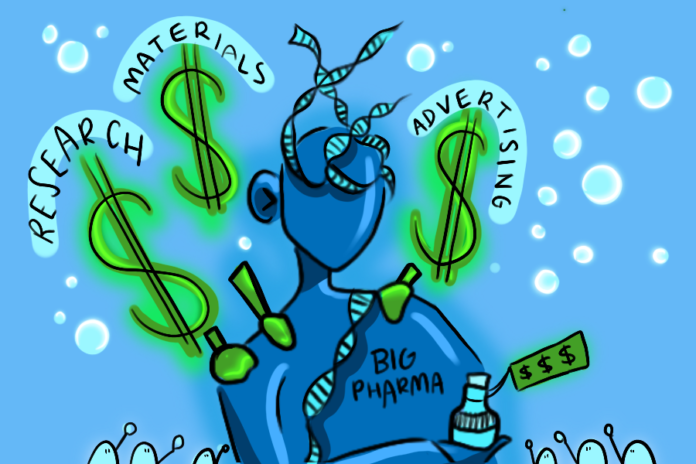Eliminating the middleman is a necessary step toward a healthier society
By MAYA KORNYEYEVA — mkornyeyeva@ucdavis.edu
Global pharmaceutical companies are constantly under fire from buyers to lower the prices of their medications. Companies like Pfizer, Roche and AbbVie have been known to charge up to tens of thousands of dollars for their life-saving drugs, leading patients to question the fairness of these prices and demand that large pharmaceutical companies, also known as “Big Pharma,” put a bigger focus on the general affordability of their medicines.
But what seems to be the issue? Wouldn’t making medication more affordable be an easy move to defuse tensions among consumers and better the reputation of Big Pharma brands? To answer this, we must first consider the factors that go into the development of new drugs.
Before being approved by the Food and Drug Administration (FDA), clinical applications go through many unsuccessful trials, averaging about nine failures before they are able to offer a safe drug to the general public. Each iteration of the medication can cost millions of dollars, not to mention the funding necessary to advertise the newly-developed drug and pay for the production process.
By this measure, the profit margin of Big Pharma companies was, on average, 21% last year, compared to other large public industries like banks, which brought in a profit margin of roughly 29.7%. The reality of each medication being a billion-dollar project, consisting of many unsuccessful trials, accounts for the high costs of new drugs and the need for pharmaceutical companies to retain a profit in order to continue to fund the research and development of more medicines. All the same, we must acknowledge that there is a problem with the high prices.
Yes, they are technically necessary to keep Big Pharma and its mission alive, but they wouldn’t be so steep if the federal government stepped in to negotiate prices for low-income areas and for Americans who can’t afford pharmaceutical drugs.
Right now, health insurance companies typically have the capacity to negotiate with Big Pharma companies because they cover a majority of client healthcare costs. However, those who can’t afford insurance need the government to step in as an advocate to create deals with these drug companies that ensure profitability and provide a cushion of coverage for low-income people.
In creating this close relationship between the government and pharmaceutical companies, you can essentially eliminate the middleman between drug developers and those who pay for the medicine; the fewer people involved, the lower the associated costs and the more direct communication in regard to prices.
An additional benefit of cutting out the middleman would be a quicker reaction time to events like pandemics. With the government and pharmaceutical companies working together, drugs could be developed faster and more efficiently, tightening interactions between these two key players and ensuring a prompt response to public health emergencies.
In fact, there are already federal government healthcare programs around the world that work precisely in this way. For example, the state-level eradication programs of hepatitis C in Georgia engaged pharmaceutical companies and allowed them to recoup their costs by buying in bulk to cover more people. Thus, lower prices were artificially created through government intervention, while the profitability of the pharmaceutical industry remained relatively unimpacted.
The government playing a larger role in assisting citizens with healthcare can also reduce future costs by making the process of recovery faster and more efficient for individuals and reducing the probability of the progression of a disease or chronic illness. An example of this is curing hepatitis C early on, before the more costly surgery and liver transplant.
Finally, from a macroeconomic perspective, a healthier society overall means a more reliable workforce and therefore a stronger economy. Keeping citizens healthy should be a major priority of the federal government, not only for ethical reasons, but also because of economic implications.
It is undeniable that Big Pharma is first and foremost a business, yet it is irrational to assume that they are overcharging customers solely on the basis of exploiting them to make a profit.
The issue of increasingly high prices can be solved by eliminating middlemen. By creating a collaborative relationship between the federal and state governments and drug companies, patients who normally cannot advocate for themselves will have a voice, ensuring that prices are manageable while keeping Big Pharma companies profitable and operational. This is a difficult and strenuous process, I know, but one that is extremely necessary for both pharmaceutical companies and those they serve.
Written by: Maya Kornyeyeva — mkornyeyeva@ucdavis.edu
Disclaimer: The views and opinions expressed by individual columnists belong to the columnists alone and do not necessarily indicate the views and opinions held by The California Aggie.




